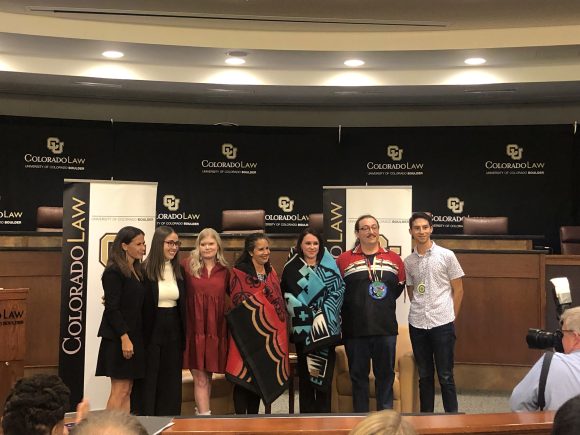
Justice Angela R. Riley (third from right) poses with leaders of the Native American Law Students Association (NALSA) and Professor Suzette Malveaux (middle). (Ann Marie Vanderveen/CU Independent)
Justice Angela R. Riley spoke at the 11th Annual John Paul Stevens Lecture in the University of Colorado Boulder’s Wolf Law Building on Tuesday, Oct. 18. Justice Riley made history as the first justice of the high court of an Indigenous nation to present at this event.
Since 2011, the university has invited an honored jurist to Colorado Law to discuss current topics in the American legal world. This year, Justice Riley, the chief justice of the Supreme Court of the Citizen Potawatomi Nation of Oklahoma, addressed the role of tribal courts as the “third sovereign” in her talk titled “The Third Sovereign: Tribal Courts and Indian Country Justice.” Supreme Court Justice Sandra Day O’Connor originally laid out tribal courts’ role as the third sovereign during the Indian Sovereignty Symposium in Tulsa, Okla. in 1996.
Justice Riley joined the court in 2003, becoming the youngest justice and first female justice to serve on the court and then became Chief Justice in 2010. She currently teaches law and American Indian studies and holds various other advisor and directorial roles for Indigenous affairs at the University of California Los Angeles.
Dean Lolita Buckner Inniss began the talk with CU Boulder’s land acknowledgment, which set the stage for the “Fireside Chat,” an interview of Justice Riley where she discussed the importance of tribal sovereignty, particularly in the legal world.
“It’s at the heart of it, really,” Justice Riley said when asked about the role of tribal courts in sovereignty. “The law that’s being applied at the tribal court is the law of the tribe itself.”
The Indian Reorganization Act of 1934 began the modern tribal court system today. It granted certain rights to tribes for “home rule” and the establishment of various organizations. The act allowed tribes to have officially recognized self-government and, as a result, more than 150 tribes adopted constitutions. The loosening of federal control created an environment in which tribal courts could form.
“[Tribal legal systems] are really at the core of self-determination,” Justice Riley said. “And I think it’s no surprise that one of the key efforts of the United States, in terms of trying to undermine tribal sovereignty historically, was to criminalize tribal courts.”
In Colorado, the tribal justice systems include the Southern Ute Indian Tribe and the Ute Mountain Ute Agency, both located in southwestern Colorado.
Justice Riley also spoke of the disproportionate violence enacted on Indigenous women and girls and the potential of the tribal legal system to resolve some of these matters.
“There are about 85% of Indigenous women and Alaska Native women who have been subjected to violence at some point during their lives,” said Professor Suzette Malveaux, director of the Byron R. White Center, who gave Justice Riley questions throughout the talk.
Justice Riley said the reauthorization of the Violence Against Women Act maintains the legal sovereignty of tribal courts.
“[The act] acknowledges tribes’ inherent sovereignty to have criminal jurisdiction over non-Indians who commit certain kinds of crimes, mostly related to domestic violence and sexual assault,” she said.
Ultimately, Justice Riley underscored the self-determination of Native American tribe governances.
The U.N. adopted the Declaration on the Rights of Indigenous Peoples in 2007 to protect the well-being of Indigenous people globally by calling on governments to ensure protections for certain rights, including the right to self-determination. CU Boulder Law students in the American Indian Law Program took their work to the national level in 2021 with The Tribal Implementation Toolkit, a guide to how tribes in the U.S. can implement these UN standards through tribal lawmaking.
“Tribes can be the leaders in this,” said Justice Riley, referencing the process of monitoring the progress of Indigenous rights. “Again, achieving justice on our own, being the model, being good Native governments.”
Contact CU Independent Staff Writer Ann Marie Vanderveen at anva3588@colorado.edu.
